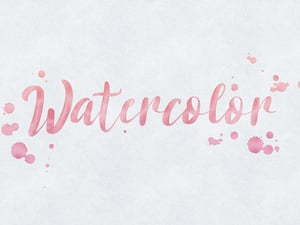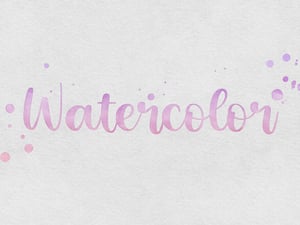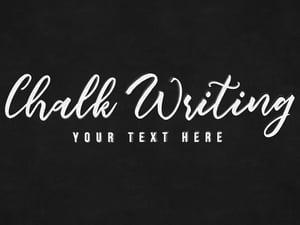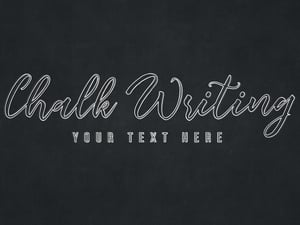
How to Create Text Made out of Pencils in Illustrator
Bend and manipulate graphics around paths
This fun effect is great for 'back to school' type graphics and also a good learning experience for using Art Brushes in Illustrator to manipulate and bend vector graphics around shapes such as text.
Drawing Tools Vector Art Brushes.Step 1
Start by launching Illustrator CS6 or newer and creating a new document. This tutorial uses the corner radius feature which was introduced in version CS6, if you have an older version you may need to round the corners manually.
Step 2
The first thing to do is draw a pencil, this can be done by using a series of simple rectangle shapes. Start with a tall yellow rectangle 220 x 18 pixels, and then duplicate or draw another rectangle above it, delete one point and move the other to the center to create a triangle. Then finally duplicate the triangle and cut out a section for the tip.
Step 3
Add some more details to the pencil by using 6px wide rectangles for depth, and round the the bottom left and right corners 2 pixels. I have intentionally kept this part of the tutorial brief as the pencil is completely up to you providing it is roughly 16 pixels wide. Important: make sure the triangle layers are at the top of the layers list.
IMPORTANT UPDATE - Please read carefully
The rest of the tutorial instructs you to create 3 different size pencils. I have since discovered that this is not necessary. Please ignore these instructions and simply use the medium sized pencil and the Stretch Between Guides feature when creating the brush instead as shown below. Apologies for any confusion this causes, but I felt it was important to update this tutorial with the more efficient method which also produces better results.
Apologies for any confusion this causes, but I felt it was important to update this tutorial with the more efficient method which also produces better results.
Step 4
Some of the paths we are going to use this pencil on will be longer than others so we need a few different sizes to use. The original pencil should be roughly 240 pixels tall, but also create a small version 140 pixels tall and a large version 340 pixels tall.
Step 5
Select the small pencil and create a new Art Brush.
Step 6
Name the brush 'Pencil (Small)' and use the default settings.
Step 7
Repeat steps 5 and 6 for the other two pencils, name them 'Pencil (Medium') and 'Pencil (Large)'.
Step 8
Draw two new horizontal guides at Y: 200 px and 320 px.
Step 9
Now it's time to start drawing out letters. Start with the 'P' for 'Pencils' by drawing a rectangle shape with the 'Pencil (Large)' Art Brush and no fill. Visually align it to the top guide. Tip: the direction of the brush will probably change as you edit the shape, to flip it again click on the end point of the path with the Pen tool.
Step 10
Full round the top right and bottom right corners of the rectangle.
Step 11
Create a new vector point on the bottom path and delete a section to break the shape apart as shown below.
Step 12
Move the bottom left point down to meet the bottom guide.
Step 13
Move the point that we created in step 11 left to overlap the vertical line slightly.
Step 14
Highlight the top left point and increase the radius to 12 px.
Step 15
Draw another rectangle for the base of the 'E'. Use the 'Pencil (Medium)' brush, and align it to the bottom guide.
Step 16
Delete the right line segment to break the shape apart.
Step 17
Duplicate the path and align it with the top guide.
Step 18
Delete the bottom right point on the duplicated shape, and switch the brush to 'Pencil (Small)'. Also move the bottom left point down slightly to overlap the other shape more.
Step 19
On the lower path, move the top right point left slightly.
Step 20
Select the top and bottom corner points shown below, and increase the radius to 12 px.
Step 21
Use the Pen tool to draw an 'N' shape, use the 'Pencil (Large)' brush and align the start and end points to the guides, but overshoot slightly on the diagonal line corners as they will get smaller when we round them in the next step.
Step 22
Increase the radius to of the diagonal line corners to 6 px. You may need to undo and tweak the position of the points so that they align to the guides when rounded.
Step 23
Draw another rectangle for the 'C'. Use the 'Pencil (Medium)' brush and align it to the guides.
Step 24
Fully round the corners on the rectangle.
Step 25
Delete the line segment shown below to break the shape apart.

Step 26
This one is nice and easy, draw a line segment for the 'I' and use the 'Pencil (Small)' brush.
Step 27
Use the Pen tool to draw an 'L' shape. Use the 'Pencil (Medium)' brush and align it to the guides.
Step 28
Select the corner of the 'L' shape and increase the radius to 12 px.
Step 29
The 'S' is the trickiest letter to draw so far, it cannot be easily done with basic shapes so instead I recommend using a standard sans serif font to type an 'S' then use the Pen tool to trace it (along the center). Use the 'Pencil (Large)' brush and align it to the guides.
Step 30
The text should now look like this Select all paths (ungrouped) and apply a Drop Shadow effect Opacity: 15%, X Offset: 2px, Y Offset: 4px, Blur: 0.
Select all paths (ungrouped) and apply a Drop Shadow effect Opacity: 15%, X Offset: 2px, Y Offset: 4px, Blur: 0.

Result & Conclusion
For a finishing touch, add a dark grey background (#343638). And here is the result: This a fun effect to create and can be useful for projects such as 'back to school' promotional graphics, but is also a great way to learn about using Art Brushes in Illustrator. Hopefully you have enjoyed following along with this tutorial. If you're looking to take it even further, this effect should also work well with other objects such as pens, paint brushes and crayons etc.
This a fun effect to create and can be useful for projects such as 'back to school' promotional graphics, but is also a great way to learn about using Art Brushes in Illustrator. Hopefully you have enjoyed following along with this tutorial. If you're looking to take it even further, this effect should also work well with other objects such as pens, paint brushes and crayons etc.
Download Drawing Tools Vector Art Brushes
 This pack features 8 vector drawing tools from pens and pencils to paint brushes. They are supplied as regular vectors and Illustrator Art Brushes which allows you to wrap them around paths for creative effects.
Download
This pack features 8 vector drawing tools from pens and pencils to paint brushes. They are supplied as regular vectors and Illustrator Art Brushes which allows you to wrap them around paths for creative effects.
Download









Comments